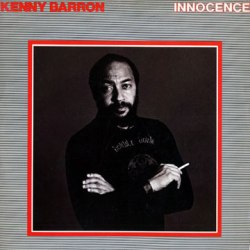Kenny Barron – Innocence (1978)
Kenny Barron – Innocence (1978)

A1 Sunshower (12:05) A2 Innocence (10:07) B1 Bacchanal (7:58) B2 Sunday Morning (8:40) B3 Nothing To Fear (7:21) Bass - Buster Williams (tracks: A1, A2, B1) , Gary King (tracks: B2, B3) Drums - Ben Riley (tracks: A1, A2, B1) , Brian Brake (tracks: B2, B3) Engineer - Vince McGarry Keyboards, Arranged By - Kenny Barron Percussion - Billy Hart Saxophone - Sonny Fortune (tracks: A1, A2, B1) Trumpet - Jimmy Owens (tracks: B2, B3)
A thorough examination of Kenny Barron's musical accomplishments over a span of 50 years necessitates a discography of more than 200 pages. That's because in addition to a distinguished career as soloist and leader he has served as one of the most dependable sidemen in all of post-bop mainstream modern jazz. More than 40 albums have appeared under his name, and his presence on literally hundreds of recordings by other musicians paints a panoramic picture of Kenny Barron's lifelong devotion to the music.
Born in Philadelphia, PA, on June 9, 1943, he took on the piano at the age of 12, with a little help from Ray Bryant's sister, known today as the mother of guitarist Kevin Eubanks. Three years later, on the recommendation of his own big brother saxophonist Bill Barron (1927-1989), he joined Mel Melvin's rhythm & blues band. The aspiring pianist gained more experience while working with drummer Philly Joe Jones and saxophonist Jimmy Heath as well as multi-instrumentalist Yusef Lateef in Detroit. Lateef's album The Centaur and the Phoenix (1960) was Kenny Barron's first modern jazz recording project -- not as a performer (Joe Zawinul was the pianist on this date) but as composer and arranger.
His recording debut as an improvising artist took place shortly after he moved to New York in 1961 and cut the first of many albums with his brother, who often aligned himself with two graduates of the Charles Mingus Jazz Workshop, trumpeter Ted Curson and saxophonist Booker Ervin. A session in 1962 found Barron working with trumpeter Dave Burns, onetime member of sax and flute man James Moody's exciting bop orchestra. Moody himself played an important role in Barron's career, first hiring him to perform at the Village Vanguard, then bringing him into Dizzy Gillespie's band. Barron stuck with Diz and Moody until 1966, performing at clubs and festivals on both coasts and touring through France and England.
Kenny Barron's first great year of independent recording activity was 1967. In addition to co-leading a band with trumpeter Jimmy Owens, the pianist made records with trumpeter Freddie Hubbard and saxophonists Joe Henderson, Stanley Turrentine, Tyrone Washington, Booker Ervin, and Eric Kloss. Barron seldom recorded with anyone just once. His discography is thickly woven with inspiring names that recur with the regularity of intricate and colorful patterns that invite further scrutiny. Examples of artists who made a lot of records with Barron during the 1970s are sax and flute men James Moody and Yusef Lateef and bassists Ron Carter and Buster Williams, with people like Earl and Carl Grubbs, Marion Brown, and Marvin "Hannibal" Peterson expanding the range of expression beyond perceived parameters of predictability and accessibility. This healthy combination of freedom and discipline would continue to bear fruit as Barron worked regularly with saxophonists Chico and Von Freeman, John Stubblefield, Nick Brignola, and Stan Getz (with whom he toured extensively during Getz's twilight years). The stylistic range continued to widen as Barron sat in with violinists Michal Urbaniak and John Blake, drummer Elvin Jones, and singing trombonist Ray Anderson.
During the '80s, Kenny Barron composed the score for Spike Lee's film Do the Right Thing, appeared on multi-performer tribute albums honoring composers Nino Rota and Thelonious Monk, and became a founding member (with Charlie Rouse, Buster Williams, and Ben Riley) of the definitive Monk legacy band, known as Sphere. Later developments continued to illustrate Barron's remarkable ability to blend with and complement a broad spectrum of artists, such as trumpeters Lee Morgan, Johnny Coles, Chet Baker, Woody Shaw, Eddie Henderson, Rebecca Coupe Franks, Terence Blanchard, and Wallace Roney; clarinetists Perry Robinson and Alvin Batiste; saxophonists Benny Carter, Gary Bartz, Lee Konitz, Eddie Harris, Bobby Watson, Frank Morgan, and Ernie Watts; guitarists George Freeman, Larry Coryell, Ted Dunbar, Jim Hall, and Joshua Breakstone; organist Jimmy McGriff; violinist Regina Carter; bassists Red Mitchell, Dave Holland, and Santi Debriano; vibraphonists Milt Jackson, Bobby Hutcherson, and Charlie Shoemake; drummers Louis Hayes, Roy Brooks, and Roy Haynes; percussionist Babatunde Lea; and bandleader Gerald Wilson.
Barron's history of collaborations with vocalists begins with nonchalant scatter Jackie Paris and includes Joe Lee Wilson, Michael Franks, Janis Siegel, Roseanna Vitro, Maria Muldaur, Sheila Jordan, Sathima Bea Benjamin, Teresa Brewer, Mark Murphy, Jimmy Scott, Roberta Flack, Jane Monheit, Jon Lucien, Abbey Lincoln, and Ann Hampton Callaway. A respected educator who has taught at Rutgers, Juilliard, and the Manhattan School of Music, Kenny Barron continues to create music of exceptionally high quality and substantial depth, something he has done for half a century, whether using the Fender Rhodes electromechanical keyboard, a plugged-in harpsichord, a synthesizer, or his lifelong companion, that fundamental jazz instrument, the piano. --- arwulf arwulf, allmusic.com
download (mp3 @256 kbs):
uploaded yandex 4shared mega solidfiles zalivalka cloudmailru filecloudio oboom
Zmieniony (Sobota, 03 Styczeń 2015 09:49)








